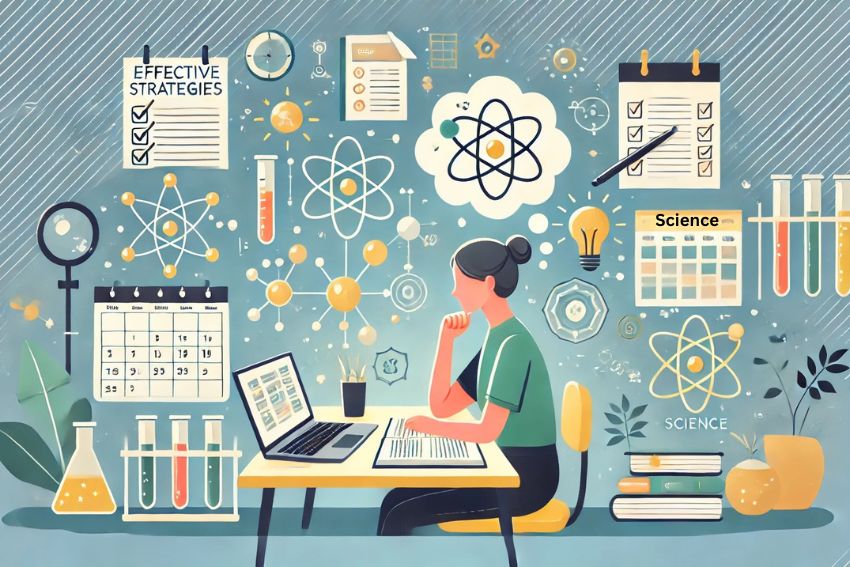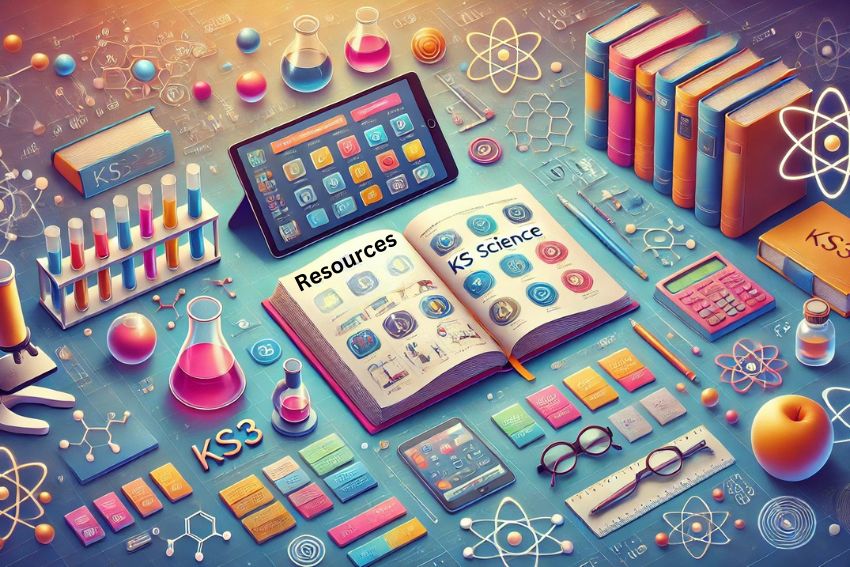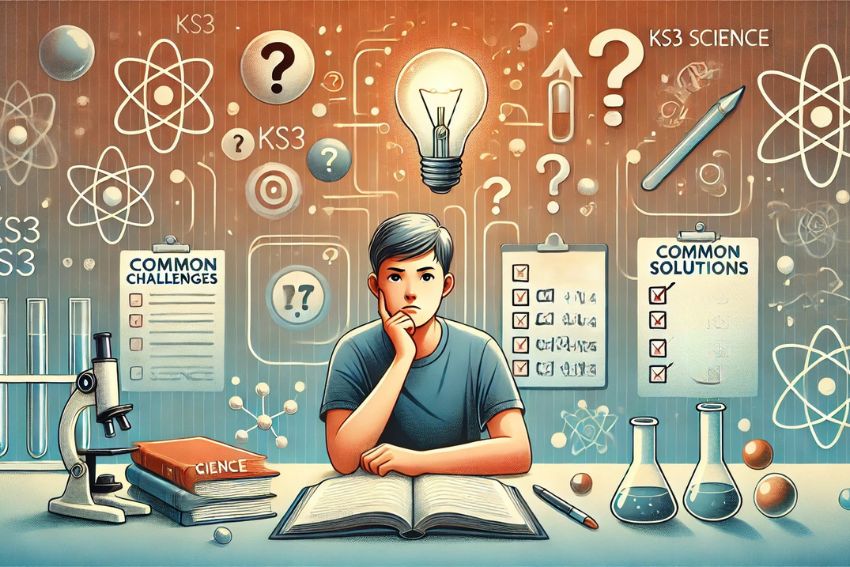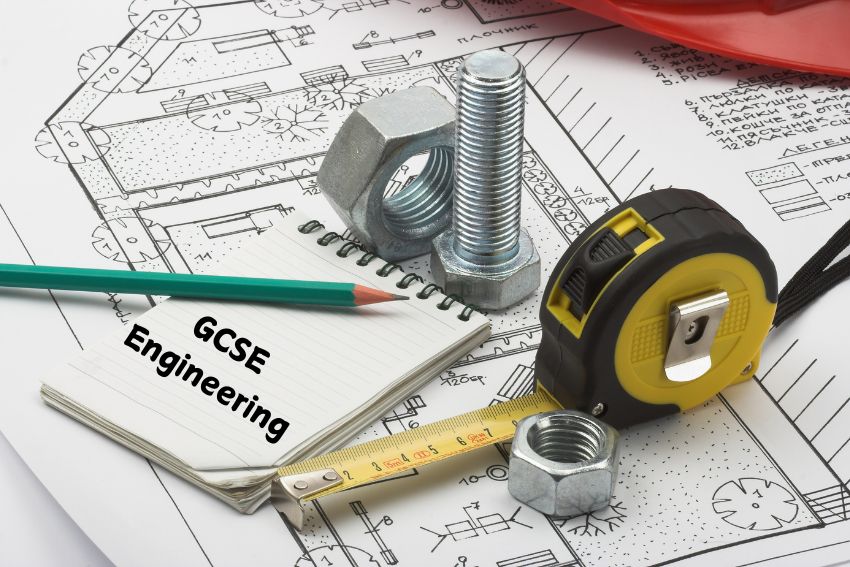KS3 Science (Key Stage 3 Science) is a vital part of the UK education system. It introduces students to main scientific principles and helps them build a foundation for later success in GCSEs. Covering years 7, 8, and 9, the KS3 science curriculum combines biology, chemistry, and physics in an engaging way to spark curiosity and understanding.
Key Stage 3 Science helps students develop critical thinking and problem-solving skills. It ensures they gain confidence in tackling advanced scientific questions. From hands-on experiments to detailed KS3 science worksheets, students can explore topics that explain how the world works around them.
In this blog, you’ll discover a detailed breakdown of the KS3 science curriculum and its key features. Also, we’ll guide you on how to make the most of available resources, including free science lessons and revision tools. Whether you’re a student or a parent, this blog aims to make your journey through Key Stage 3 Science successful and enjoyable.

Breakdown of the KS3 Science Curriculum
The KS3 science curriculum is part of the KS3 national curriculum and is designed to give students a solid understanding of scientific concepts. It covers three core subjects: biology, chemistry, and physics each contributing to a well-rounded foundation in Key Stage 3 Science.
Core Subjects
Biology: Students explore exciting topics like cell biology, ecosystems, and human body systems. These areas help them understand the living world and how life functions.
Chemistry: The focus is on the building blocks of matter. Topics include atoms, elements, compounds, and chemical reactions, providing the tools to explore the world of substances.
Physics: Key topics include forces, energy, waves, and the structure of matter. These concepts help students understand the physical principles that shape our universe.
Year-wise Progression
Science Year 7: In Year 7, students are introduced to the basics of all three core subjects. This includes learning about cells, the periodic table, and simple forces.
Science Year 8: Year 8 builds on these basics, introducing more complexity. Topics such as photosynthesis, chemical bonding, and energy transfers are explored in greater depth.
Science Year 9: By Year 9, students are preparing for GCSE-level learning. They tackle advanced topics like respiration, the reactivity series, and more detailed studies of waves and motion.
The KS3 national curriculum ensures a step-by-step progression across science year 7, year 8, and year 9. This gradual increase in complexity prepares students to confidently approach their GCSEs.
Effective Study Strategies for KS3 Science
Mastering the KS3 science curriculum requires a thoughtful approach to studying. With the right strategies, students can confidently tackle challenging topics and perform their best.
Active Learning Techniques
Active learning makes studying more engaging and effective. Summarizing information from lessons or a Key Stage 3 Science books into short notes helps simplify complex topics. Creating mind maps is another excellent way to visualise connections between concepts, such as how ecosystems interact in biology or the reactivity of elements in chemistry. Teaching concepts to others, even a friend or family member, reinforces understanding and builds confidence.
Utilizing Resources
Having the right Key Stage 3 Science book is a great starting point, providing clear explanations and practice problems. Online platforms like BBC Bitesize and NRICH offer additional support through interactive tools and downloadable KS3 science worksheets. These resources align with the Science Education in the UK and provide practice opportunities to strengthen knowledge.
Regular Revision
Consistent revision is key to retaining knowledge. Using KS3 science worksheets for practice and revisiting past lessons regularly prevents forgetting important concepts. Completing quizzes and past papers not only solidifies learning but also helps students prepare for assessments by familiarizing them with question formats and timing.
By combining active learning, reliable resources, and regular revision, students can master the KS3 science curriculum with ease and confidence.

Recommended Resources and Materials For KS3 Science
Mastering the KS3 science curriculum becomes easier with the right tools at your fingertips. Using a mix of textbooks, online platforms, and interactive tools helps students fully engage with their studies. Whether you’re revising core topics or exploring new ideas, these resources are designed to support your journey through Key Stage 3 Science.
Textbooks
A reliable Key Stage 3 science book is essential for comprehensive learning. Popular options, such as CGP KS3 Science Complete Study & Practice or Collins KS3 Science Revision Guide, provide detailed coverage of the KS3 science curriculum. These books include clear explanations, practice questions, and revision tips that align perfectly with the needs of science students.
Online Platforms
Websites like BBC Bitesize offer free science lessons and quizzes tailored to the KS3 science curriculum. Another great platform is NRICH, which provides problem-solving challenges that integrate well with science and maths concepts. These platforms are perfect for enhancing understanding each KS3 science subject while keeping learning interactive and fun.
Furthermore, studying Key Stage 3 Science is easier with free online lessons. Whether it’s physics, biology, or chemistry, these resources cover everything you need. Explore the links below to start practicing!
Interactive Tools
Interactive resources, such as PhET Interactive Simulations, bring scientific concepts to life through virtual experiments. For students looking to reinforce knowledge with games, Kahoot! offers engaging quizzes that help with KS3 science revision. Printable KS3 science worksheets are another excellent option for hands-on practice at home.
By using these resources, including free science lessons and KS3 science worksheets, students can confidently navigate the Key Stage 3 Science journey.
Key Stage 3 Science: Assessment and Evaluation
Assessments play a key role in understanding progress and identifying areas for improvement in KS3 Science. They are an integral part of the national curriculum science KS3, ensuring students develop the knowledge and skills needed for success in their studies and beyond.
KS3 Science: Understanding Assessments
Students in KS3 Science will encounter two primary types of evaluations:
- Formative Assessments: These include quizzes, classwork, and homework tasks designed to monitor ongoing learning. They provide immediate feedback and help students focus on areas that need improvement.
- Summative Assessments: These are end-of-topic or end-of-term tests that assess overall understanding of the KS3 science curriculum. Summative tests often mirror the style of GCSE exams, helping students prepare for future challenges.
KS3 Science: Sample Questions
Practicing sample questions is a vital part of KS3 science revision. Here are a few examples:
- Biology: Explain the process of photosynthesis and identify the role of chlorophyll in plants.
- Chemistry: Draw the structure of an atom and label its parts (protons, neutrons, and electrons).
- Physics: Calculate the force acting on an object if its mass is 10 kg and it accelerates at 2 m/s².
KS3 Science: Marking Schemes
Understanding how answers are evaluated is crucial for success. Examiners often look for:
- Clear explanations with key scientific terms.
- Accurate use of diagrams where applicable.
- Step-by-step calculations, especially in physics and chemistry.
Marking schemes are typically structured to reward students for both correct answers and their methods, so showing work clearly is essential.
By familiarizing themselves with these assessment formats and practicing regularly, students can excel in the KS3 Science curriculum.

Common Challenges and Solutions in KS3 Science
Every student faces challenges while navigating Key Stage 3 Science. By identifying tricky topics and finding effective solutions, students can overcome these hurdles and succeed in their studies.
Identifying Difficult Topics
Some topics in the national curriculum science KS3 are more complex and may require extra effort to understand: Science Year 7: Students often struggle with abstract concepts like cell structures in biology or forces in physics. Science Year 8: Understanding chemical bonding or energy transfers can feel overwhelming without a clear explanation. Year 9 Science: Advanced topics, such as the reactivity series in chemistry or detailed wave properties in physics, may require extra practice.
Practical experiments can also be challenging, especially when students are unsure how to follow procedures or interpret results.
Overcoming Obstacles
Here are some tips to help students tackle these challenges:
- Break Down Complex Theories: Simplify tough concepts by using visual aids, such as diagrams or videos, to make them easier to understand.
- Ask for Help: Teachers are valuable resources. Encourage students to ask questions and seek clarification during lessons.
- Use Additional Resources: Key Stage 3 Science books, online tools, and worksheets aligned with the national curriculum science KS3 can provide extra support.
- Practice Regularly: Revisiting difficult topics through quizzes and worksheets can improve retention and confidence.
By identifying and addressing challenges in science year 7, science year 8, and science year 9, students can steadily build their knowledge and skills in Key Stage 3 Science.
Conclusion
KS3 Science is an essential stage in every student’s education, forming a strong foundation for understanding the world around us. In this blog, we explored the KS3 science curriculum, breaking it down into core subjects like biology, chemistry, and physics. We discussed effective study strategies, assessment formats, and ways to overcome common challenges.
Science is more than just a school subject, it’s a gateway to curiosity and discovery. By continuing to explore science topics beyond the classroom, students can build skills that benefit them for life. Resources like Key Stage 3 Science books, interactive tools, and worksheets are excellent for independent study. For those who need personalised guidance, online KS3 Science tutors can provide extra help, tailoring lessons to individual needs and strengthening areas of difficulty.
The journey through science is one of continuous learning and wonder. Keep practicing, exploring, and asking questions-because every discovery starts with curiosity!
FAQs:
What is KS3 science?
KS3 Science is the UK curriculum for years 7 to 9. It introduces students to core scientific concepts and practical experiments, building a strong foundation for GCSE-level studies.
What grade level is Key Stage 3?
Key Stage 3 corresponds to years 7, 8, and 9 in the UK, typically covering students aged 11 to 14.
What is taught in KS3 science?
The KS3 science curriculum covers biology, chemistry, and physics. Students learn topics like cell biology, chemical reactions, forces, and energy. It ensures a balanced understanding of scientific principles across all three subjects.
Why is KS3 important?
KS3 is crucial because it builds the foundation for advanced learning in GCSEs and beyond. It introduces key concepts, develops critical thinking skills, and prepares students for academic success in science and other subjects.
What resources are best for KS3 Science revision?
Some excellent resources for KS3 Science revision include Key Stage 3 Science books, KS3 science worksheets, free science lessons from BBC Bitesize, and interactive tools like PhET Simulations. Regular use of these resources helps reinforce learning and prepares students for assessments.








